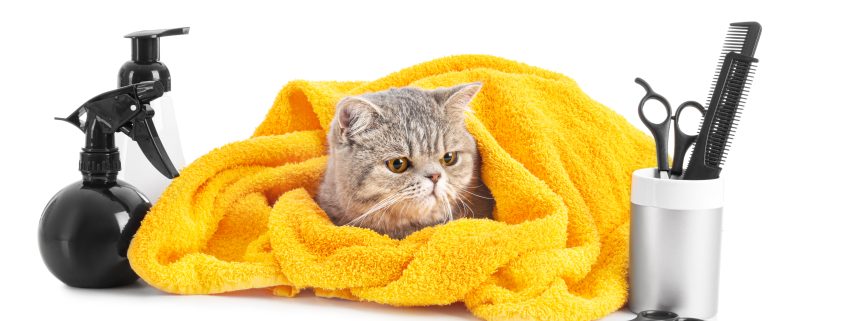Any cat owner will tell you that their pet spends a significant amount of time grooming themselves. Even so, helping your feline friend maintain their hygiene and overall well-being through regular grooming sessions is essential. While grooming your cat may seem intimidating, especially if you are a beginner, the tips and tricks in this blog will help you get started and make the process easier.
Do Cats Need to be Groomed?
The short answer is yes, but the ideal grooming routine will vary from cat to cat.
All cats groom themselves regularly, but some cats may require additional help from you or a professional. This is especially true for long-haired cats, obese cats, or senior cats. If you notice your cat is experiencing matting, itching, or flaky skin, or isn’t able to reach certain areas, it’s time to take charge of their grooming. You can also consult your veterinarian to get advice on which grooming steps they recommend to keep your cat healthy and happy.
Grooming at Home
Bathing: While cats are generally meticulous self-groomers, occasional baths may be necessary, especially for long-haired breeds or if your cat gets into something dirty or sticky. Use a cat-specific shampoo and warm water, ensuring a secure grip on your cat during the bath. Be mindful of their ears, and avoid getting water or soap in their eyes. Getting them used to the bath when they are still kittens can help them relax more as adults, but don’t bathe them too often to avoid stripping their skin of its natural oils.
Brushing: Brushing your cat not only removes dirt, grease, and dead hair from their coat, but it helps to remove skin flakes and stimulates blood circulation, improving the overall condition of their skin. One or two brushing sessions per week will help your feline friend keep their coat healthy and shining.
Nail Trimming: Keeping your cat’s nails trimmed is important for their comfort. Use cat nail clippers or a nail grinder designed for pets, and familiarize yourself with how to use it before introducing it to your pet. Cut the nails short, but not so short that you cut the quick, which is the soft cuticle area that contains the main blood vessels and nerves that run through your pet’s nails. Cutting to the quick can cause pain and bleeding.
Ear Cleaning: Regular ear cleaning helps prevent wax build-up, infections, and ear mites. Use a pet ear-cleaning solution and cotton balls or pads. Gently wipe the visible parts of the ear, avoiding going too deep into the ear canal. If you notice excessive wax buildup, a dark area inside the ear, or signs of discomfort, consult your veterinarian.
Professional Grooming
If you have a long-haired breed or if your cat is not a fan of the at-home grooming process, it may be time to consider scheduling with a professional. Professional groomers have the experience and specialized tools to handle grooming needs effectively and safely, without stressing out your kitty companion.
There are certain situations where your cat may require additional grooming care that only a professional can provide. These situations include:
- Long-Haired Breeds – Cats with long hair, such as Persians or Maine Coons, often require more frequent and thorough grooming due to their dense and prone-to-matting coats. Extra brushing and combing are necessary to prevent tangles, mat formation, and discomfort. However, if mats and tangles are already an issue, a bath and sanitary shave down from a groomer may be required.
- Senior Cats – Older cats may develop mobility issues or joint pain that can hinder their ability to self-groom. They may require assistance, particularly in hard-to-reach areas like their back or hindquarters. Regular trips to the groomer can help remove loose hair, prevent matting, and keep their coat free of dirt and debris.
- Overweight or Obese Cats – Cats that are overweight or obese may struggle to reach certain parts of their body for grooming. They may require assistance, especially in areas where skin folds may trap dirt, moisture, or debris. Taking them to a professional groomer ensures that the cleaning of these areas is done properly to prevent skin infections and maintain their hygiene.
- Cats with Skin Conditions – Some cats may develop skin conditions, such as allergies, dermatitis, or fungal infections, which require extra care. Specialized shampoos, prescribed by a veterinarian and applied by a groomer, may be necessary to treat these conditions and maintain the cat’s skin health.
Your Pets are our Priority!
At the National Animal Supplement Council (NASC), our number one priority is to promote the health and well-being of your pets. That is why we created the NASC Audit Program and the Quality Seal, which helps you identify animal health and nutritional supplements that come from responsible suppliers committed to producing the highest quality, most consistent products available. Visit our website to learn more and to see a list of NASC members who have earned the Quality Seal.


